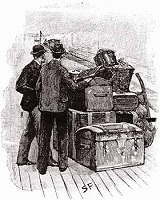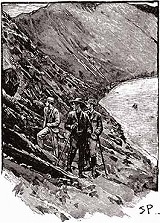I was still looking rather ruefully after the rapidly disappearing luggage-van which contained my wardrobe, when Holmes pulled my sleeve and pointed up the line.
“Already, you see,” said he.
Far away, from among the Kentish woods there rose a thin spray of smoke. A minute later a carriage and engine could be seen flying along the open curve which leads to the station. We had hardly time to take our place behind a pile of luggage when it passed with a rattle and a roar, beating a blast of hot air into our faces.

“There he goes,” said Holmes, as we watched the carriage swing and rock over the points. “There are limits, you see, to our friend’s intelligence. It would have been a coup-de-maître had he deduced what I would deduce and acted accordingly.”
“And what would he have done had he overtaken us?”
“There cannot be the least doubt that he would have made a murderous attack upon me. It is, however, a game at which two may play. The question now is whether we should take a premature lunch here, or run our chance of starving before we reach the buffet at Newhaven.”
We made our way to Brussels that night and spent two days there, moving on upon the third day as far as Strasbourg. On the Monday morning Holmes had telegraphed to the London police, and in the evening we found a reply waiting for us at our hotel. Holmes tore it open, and then with a bitter curse hurled it into the grate.
“I might have known it!” he groaned. “He has escaped!”
“Moriarty?”
“They have secured the whole gang with the exception of him. He has given them the slip. Of course, when I had left the country there was no one to cope with him. But I did think that I had put the game in their hands. I think that you had better return to England, Watson.”
“Why?”
“Because you will find me a dangerous companion now. This man’s occupation is gone. He is lost if he returns to London. If I read his character right he will devote his whole energies to revenging himself upon me. He said as much in our short interview, and I fancy that he meant it. I should certainly recommend you to return to your practice.”
It was hardly an appeal to be successful with one who was an old campaigner as well as an old friend. We sat in the Strasbourg salle-à-manger arguing the question for half an hour, but the same night we had resumed our journey and were well on our way to Geneva.
For a charming week we wandered up the valley of the Rhone, and then, branching off at Leuk, we made our way over the Gemmi Pass, still deep in snow, and so, by way of Interlaken, to Meiringen. It was a lovely trip, the dainty green of the spring below, the virgin white of the winter above; but it was clear to me that never for one instant did Holmes forget the shadow which lay across him. In the homely Alpine villages or in the lonely mountain passes, I could still tell by his quick glancing eyes and his sharp scrutiny of every face that passed us, that he was well convinced that, walk where we would, we could not walk ourselves clear of the danger which was dogging our footsteps.

Once, I remember, as we passed over the Gemmi, and walked along the border of the melancholy Daubensee, a large rock which had been dislodged from the ridge upon our right clattered down and roared into the lake behind us. In an instant Holmes had raced up on to the ridge, and, standing upon a lofty pinnacle, craned his neck in every direction. It was in vain that our guide assured him that a fall of stones was a common chance in the springtime at that spot. He said nothing, but he smiled at me with the air of a man who sees the fulfilment of that which he had expected.